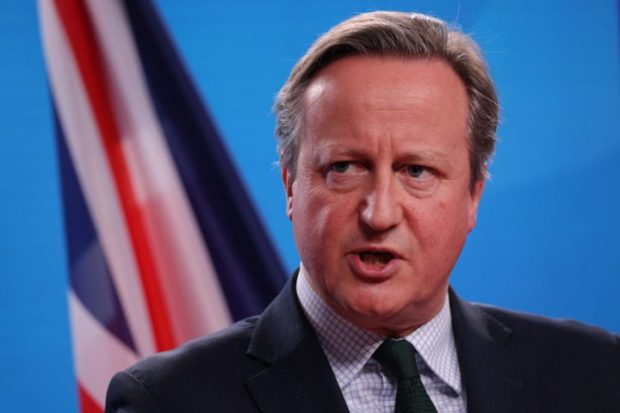There can be a hallucinatory quality to the progressive mind, a tendency to see enemies in allies and demons in opponents, to imagine a public consensus for niche propositions and to experience even mild-mannered political disagreements as near-physical attacks. One or more of these behaviours can be found across the spectrum — lefties hate other lefties, righties hate other righties, centrists hate everyone — but it is in progressivism that they most vividly concentrate. Rosie Duffield is experiencing this phenomenon rather roughly after expressing the wrong view about that deathless fixation of a disastrously overeducated generation: gender identity. The Labour MP took issue with one of the few tweets from CNN that isn’t an update from Trump’s Amerikkka:

Duffield was one of many to object to how this kind of sex-neutral wordplay erases women. So much of this tedious culture war is about trivia but complicating the language around cervical cancer is pernicious.
NHS England introduced a new HPV-focussed screening programme in December which it estimates can reduce instances of cervical cancer by a quarter. However, almost three-in-ten eligible women were not adequately screened in England in 2018/19. Communicating the importance of getting screened must be done in the plainest, simplest language possible. This is especially important among migrant women: a 2019 study found significantly lower rates of cervical screening awareness among Eastern European migrant women than native-born English women.
Yet for pointing out that ‘only women have a cervix’, Duffield was accused of ‘transphobia’. The Labour Campaign for Trans Rights charged her with ‘den[ying] the existence of trans men and many nonbinary people’ and participating in a ‘right-wing campaign to marginalise, exclude and oppress trans people’ and said it was ‘calling on our party to take action on this incident’. A statement of simple biology is now an ‘incident’.
Duffield spent much of Saturday trending on Twitter’s ‘What’s happening’ sidebar, ensuring awareness of her heresy was spread far and wide. During the Scottish witch hunts, benighted women would find themselves listed on the porteous rolls, the registers of accused to be cited for trial, on the strength of allegations from members of the public. Twitter is the porteous roll of all modern witch hunts.
The pile-on is indicative of the kind of hallucinations I’m talking about. Duffield is central-casting Labour: single mother who survived on tax credits, teaching assistant turned soft-left MP, feminist, Remainer, gay rights supporter. She has spoken in Parliament about her experience of domestic abuse. Social democrats and liberals might see a fellow-traveller but progressives see a bigot, and therein lies a self-defeating dualism in their political imagination. To imagine Duffield as a right-wing oppressor is to designate large parts of the country as such; in doing so progressives define their politics as something at odds with the public whose consent they seek to govern.
Duffield is the MP for Canterbury, a constituency recognised by Guinness World Records for the longest retention by the same party in British parliamentary history. Apart from a brief interlude with an independent Unionist MP during the Great War, Canterbury was held by the Conservatives for 160 years. That is until Duffield came along in 2017 and overturned Sir Julian Brazier’s 10,000 majority. As well as hallucinating enemies, progressives imagine their doctrinal caprices to be more widely accepted than they are, a function of a worldview constructed around ideologically-assigned virtue and practised within the echo chamber of social media. Ask a random sample of Canterbury voters — nay, a random sample of Canterbury Labour voters — whether they consider the statement ‘only women have a cervix’ bigoted and not only would nearly all respond in the negative, most would regard the very question as bizarre.
One more hallucination, since we’ve already dwelt too long on the arid anti-politics of identity. Political commitment does something to your grasp of history: all the greats of your own cause are in the past but your present opponents are always the worst there has ever been. Progressives will swear solemnly that today’s Tories are the cruellest, harshest, most right-wing ever to have stalked the Earth. If nothing else disproves this, the government’s approach to the gender culture wars should. Dominic Cummings convinced the country that quitting the world’s largest trading bloc was the route to national prosperity and that Boris Johnson was the only grown-up in the room at Westminster.
If Cummings so chose, he could turn trans radicalism into a wedge issue that would slice Labour down the middle and set the country against elite opinion. He doesn’t because clever tacticians know that wedge issues are valuable in elections but a distraction in government and because, I suspect, neither he nor his Prime Minister has the appetite or conviction for such a strategy. This is very fortunate for Labour because a sizeable section of the party is bent on diving head-first down the rabbit hole of identity politics. They don’t know how lucky they are to have the opponents they do.
Got something to add? Join the discussion and comment below.
Get 10 issues for just $10
Subscribe to The Spectator Australia today for the next 10 magazine issues, plus full online access, for just $10.




















Comments
Don't miss out
Join the conversation with other Spectator Australia readers. Subscribe to leave a comment.
SUBSCRIBEAlready a subscriber? Log in